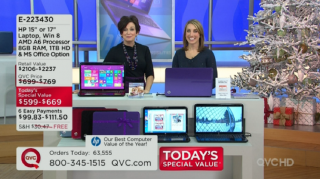Are QVC and HSN Destined to Die?
Are home-shopping networks as dead as dial-up internet? Maybe not.
For as long as I remember, there has been one network constantly in the background of my parents and now my own home, pitching and selling their products to my family for at least three decades—costing me thousands of dollars over the years: QVC.
But could their days be numbered (my colleague who edited this article did not even know who they were until they read this, yikes)? In an era where the buying preferences of millennials and younger consumers are making things like retail stores and cable TV obsolete, is there a place for a network that sells mixers, car washers, jewelry and electronic goods mostly on TV through what are largely one to three-hour infomercials?
That depends, but the short answer is that at least for the near-term, QVC will struggle. Technically named Qurate Retail, Inc. (QRTEA), its stock price is in decline with slowly sliding revenue numbers for several quarters. “Our first-quarter performance was disappointing amidst a changing retail and media landscape,” explained Mike George, the company’s president and chief executive officer, on a conference call discussing 1st quarter, 2019 revenues. Such talk doesn’t inspire much confidence.
The good news for QVC fans is the company is not sitting idle, with what looks like a plan to ensure they can stay the course for years to come. They merged their operations with HSN back in 2017, creating a sales giant only to be surpassed by Walmart and Amazon, two companies surely taking profits and customers away over time.
You do have to wonder though, is that enough in 2020? Is there a market for home shopping networks in an age of fancy websites that can sell you anything, Amazon Prime same-day delivery and alternative ways to buy the same products QVC sells?
Again, QVC is not throwing in the towel just yet but seems ready to stand its ground. They have stepped up their online sales game with a modern and sleek website. They also offer something called easypay, where the buyer can spread out payment over two-to-six payments as long as you place on file a credit card to ensure payment is received on time—no interest is charged. They also offer free shipping on many items and have some very strong sales on items that are many times more expensive anywhere else—Dyson vacuums are a great example of this. Their return policy is also stellar—and among one of the best in the industry, at least from my perspective.
I would point out that QVC may have a secret weapon that gets forgotten about: great customer service. At least for my family and me, I have always had amazing experiences with QVC agents when I have had to make a call about a problem or just a question. I never worry about an order getting lost and having to worry about a replacement or refund. They treat you with respect, always are eager to help and have always been very reasonable when I needed their help. You can’t ask for much more than that—and other industries could learn a thing or two from them.
But will all of these factors be enough to ensure QVC and HSN have a future? I certainly hope so, as I know the Kazianis family would be crushed to see the day when these networks go off the air.
Harry J. Kazianis is a Senior Director at the Center for the National Interest and Executive Editor of their publishing arm, the National Interest. His work and ideas have appeared in The New York Times, The Washington Post, CNN, Fox News, CNBC, USA Today, The Week, The Hill, the American Conservative and many other outlets across the political spectrum. Harry enjoys writing about technology issues and products from a real-world perspective, having worked in the telecommunications industry from 2000-2011. You can follow him (or yell at him) on Twitter: @Grecianformula.
Image: Screenshot.

